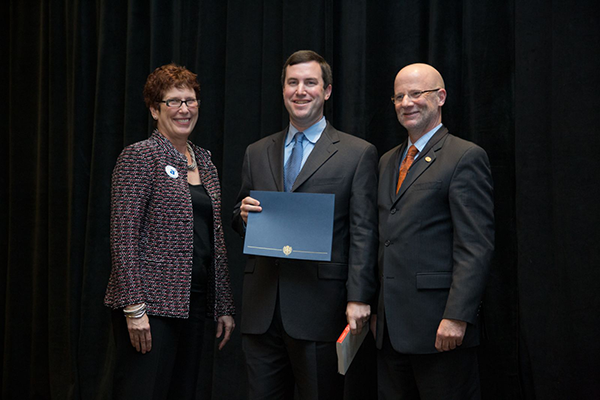You are on CGS' Legacy Site.
Thank you for visiting CGS! You are currently using CGS' legacy site, which is no longer supported. For up-to-date information, including publications purchasing and meeting information, please visit cgsnet.org.
Contact:
Julia Kent
(202) 223-3791
Washington, DC – The Council of Graduate Schools (CGS) has awarded the 2014 Gustave O. Arlt Award in the Humanities to Dr. Michael Titelbaum, Associate Professor of Philosophy at University of Wisconsin-Madison. The awards ceremony was held during the CGS 54th Annual Meeting.
The Arlt Award is given annually to a young scholar-teacher who has written a book deemed to have made an outstanding contribution to scholarship in the humanities. Dr. Titelbaum becomes the award’s 44th recipient for his book, Quitting Certainties (Oxford University Press, 2013). He received his PhD in Philosophy from University of California-Berkeley in 2008.
Dr. Titelbaum’s book presents a new approach for tackling a fundamental problem of epistemology. As a philosopher carefully rationalizes what s/he knows, it becomes necessary to accept that things can be ‘known’ with varying degrees of certainty. And over time, as new evidence is discovered and considered, the philosopher can update the degree of certainty with which they know what they know. The current standard theory of how individuals should change their degrees of belief over time (Subjective Bayesianism) has a few holes: it can’t account for situations where individuals have forgotten information; or in which the degree of certainty was based on self-locating claims. In the book, Titelbaum introduces his Certainty-Loss Framework as a way to reinterpret Bayesian methodology and alter the theory’s updating rules.

[From left: Suzanne T. Ortega, CGS President; Michael Titelbaum, winner, 2014 Arlt Award; John McCarthy, Vice Provost and Dean of the Graduate School at University of Massachusetts Amherst and member of the 2014 Arlt Award Selection Committee.]
Quitting Certainties was selected to receive the Arlt Award based on the impact the book has seen since its publication. Nominators praised Titelbaum for the way his Certainty-Loss Framework is making possible a deeper examination of commitment, consistency, and the nature of information.
Created in 1971, the Arlt Award honors the first president of CGS. The winner must have earned a doctorate within the past seven years from, and currently be teaching at, a North American university. Nominations are made by CGS member institutions and are reviewed by a panel of scholars in the field of competition, which rotates annually among seven disciplines within the humanities. This year’s field was Linguistics and Philosophy. The winner receives a $1,000 honorarium, a certificate, and travel to the awards ceremony.
The Council of Graduate Schools (CGS) is an organization of over 500 institutions of higher education in the United States and Canada engaged in graduate education, research, and the preparation of candidates for advanced degrees. Among U.S. institutions, CGS members award 91% of the doctoral degrees and 81% of the master’s degrees.* The organization’s mission is to improve and advance graduate education, which it accomplishes through advocacy in the federal policy arena, research, and the development and dissemination of best practices.
* Based on data from the 2013 CGS/GRE Survey of Graduate Enrollment and Degrees




